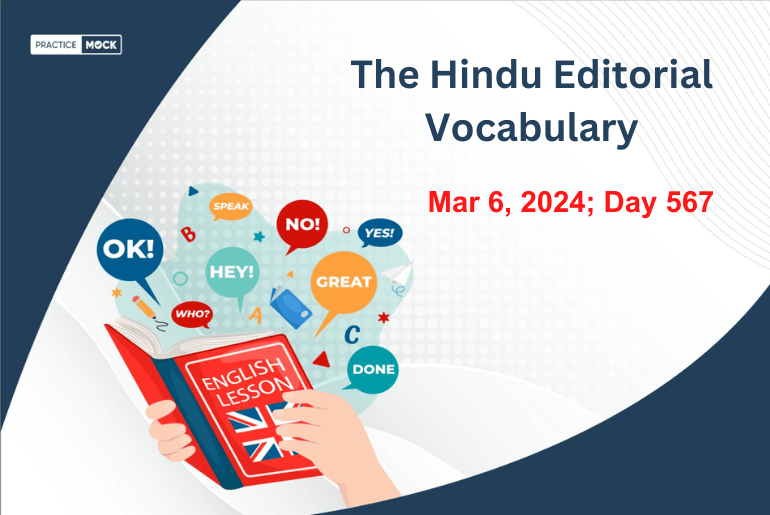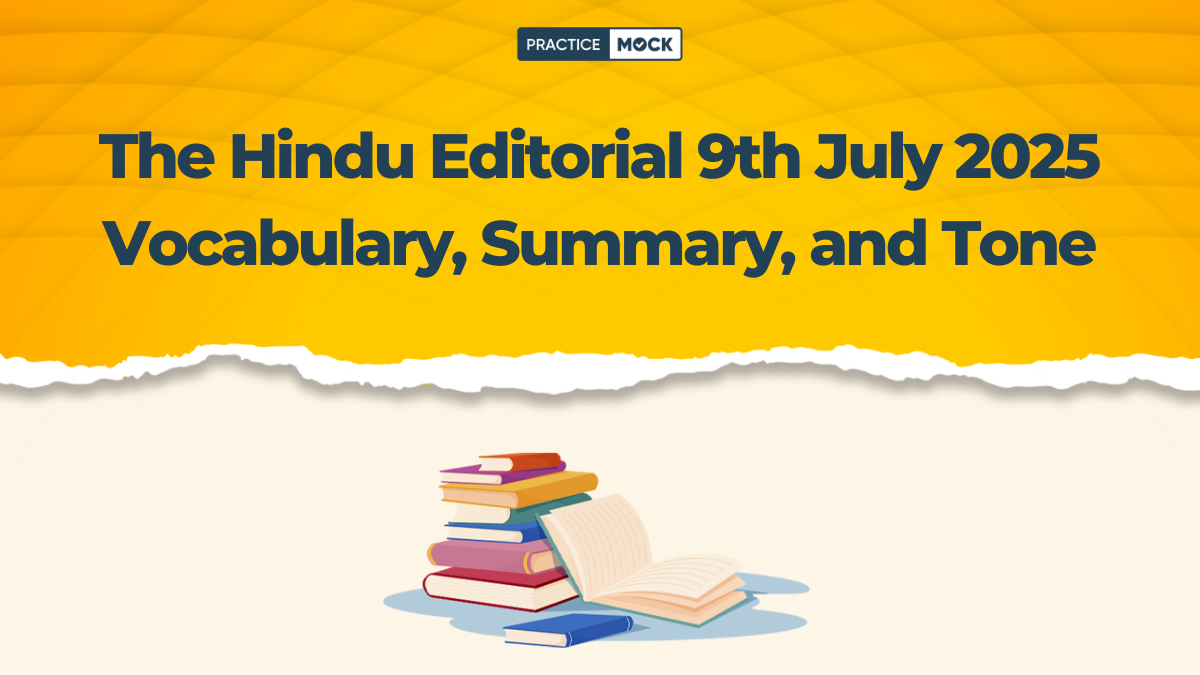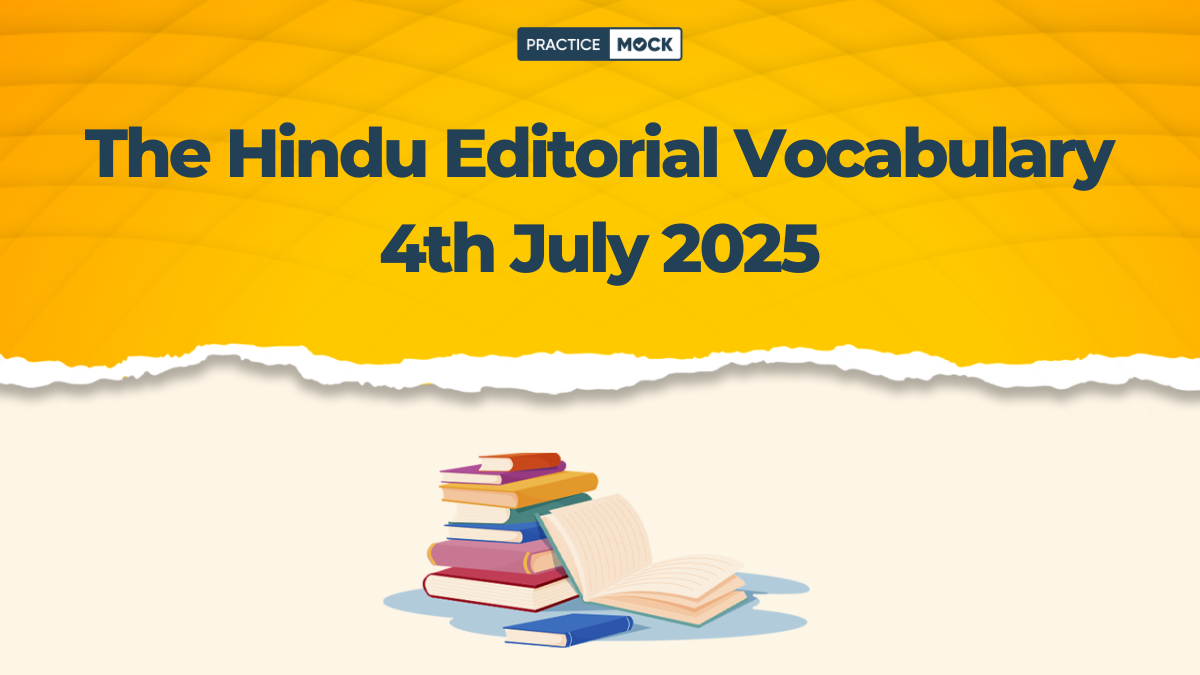The Hindu Editorial Vocabulary– March 6, 2024; Day 567


| Difficult Word/ Phrase | Contextual Sense |
| Legitimate | Reasonable and acceptable |
| Repercussions | The effect that an action, event, or decision has on something, especially a bad effect |
| Assaulted | A violent attack |
| Lamenting | To express sadness and feeling sorry about something |
| Conflagration | A large and violent event, such as a war, involving a lot of people |
| Ethnicised | The process of reducing the differences between people or groups to characteristics or appearances that are assumed to “ethnic” |
| Impunity | Freedom from punishment or from the unpleasant results of something that has been done |
| Majoritarian | Governed by or believing in decision by a majority |
| Counterparts | A person or thing that has the same purpose as another one in a different place or organization |
| Humanitarian | (a person who is) involved in or connected with improving people’s lives and reducing suffering |
| Displacement | The situation in which people are forced to leave the place where they normally live |
| Delegitimisation | To make invalid, illegal, or unacceptable |
| Radicalisation | The process of making someone become less radical (= extreme) in their political or religious beliefs |
| Promoting | To encourage people to like, buy, use, do, or support something |
Law and disorder: On Manipur, its ethnic polarisation and its law and order
The continued radicalisation of Manipuri society is a cause of concern
One of the cardinal principles of a functioning and modern democracy is that only the state, led by a government that is elected by the people, has a legitimate (reasonable and acceptable) right to use or to authorise the use of physical force. When civilian groups resort to violence against state actors without repercussions (the effect that an action, event, or decision has on something, especially a bad effect), one has to call into question the maintenance of law and order in the State of Manipur. In late February, cadres of the Meitei chauvinist group, the Arambai Tenggol, allegedly abducted a police officer, assaulted (a violent attack) him and vandalised his home. Police officers protested the attack, lamenting (to express sadness and feeling sorry about something) their inability to take action against the group. It is another matter that the group has managed to source its weapons from the looting of police stations in the valley following the ethnic conflagration (a large and violent event, such as a war, involving a lot of people) last May. Many of the weapons are yet to be seized or returned despite the government’s appeals. The police in the valley are heavily ethnicised (the process of reducing the differences between people or groups to characteristics or appearances that are assumed to “ethnic”) with barely any representation from the Kuki-Zo minority. Yet, the impunity (freedom from punishment or from the unpleasant results of something that has been done) with which the Arambai Tenggol has acted against a police official, and even assaulted a leader of the opposition in the recent past besides administering oath to legislators from the valley to pledge for its majoritarian (governed by or believing in decision by a majority) cause, suggest that such actions have either the nod of the leadership of the State government or have been deliberately ignored. The severe ethnicisation in the valley and the hills has also granted a degree of popularity to groups such as the Arambai Tenggol and counterparts (a person or thing that has the same purpose as another one in a different place or organization) in the hills, making law enforcement difficult to achieve.
It is now incumbent upon the Union government and the ruling Bharatiya Janata Party (BJP) to take into account the severity of the ethnic polarisation and the dangers posed to law and order. Humanitarian ((a person who is) involved in or connected with improving people’s lives and reducing suffering) concerns related to the displacement (the situation in which people are forced to leave the place where they normally live) of people apart, the predominance of extra-legal forces in public life in the valley and the hills points to the delegitimisation (to make invalid, illegal, or unacceptable) of the idea of the state alone having a monopoly over the use of physical force in establishing law and order. The rampant radicalisation provides an opportunity for the muzzled civic voices in Manipur, and in the valley in particular, to raise their concerns about the impunity enjoyed by such forces. Unless the Chief Minister, N. Biren Singh, cracks the whip on the Arambai Tenggol, the radicalisation (the process of making someone become less radical (= extreme) in their political or religious beliefs) of Manipuri society will continue, making a return to a much-needed civic state of affairs all the more difficult. But with Mr. Singh acting less as a Chief Minister and more as a leader promoting (to encourage people to like, buy, use, do, or support something) majoritarian politics, it is incumbent upon the BJP leadership to yet again rethink its strategy to let the status quo continue in the State.
Unlock the power of words, one step further! Download the Lists of Word-Meanings of Previous Months here.
Recent Posts
IBPS SO Cut-Off, Check Last year (2023, 2024) Cut-offs
Check IBPS SO cut-offs for 2023 & 2024. Get category-wise scores, trends, and expert tips…
IBPS PO Notification 2025 Out, Check Exam Date, Vacancy and Last Date to Apply Online
IBPS PO 2025 Notification out for 5208 vacancies. Check exam dates, new pattern, eligibility, salary,…
Vishleshan for Regulatory Exams, 9 July 2025: Disaster Risk Financing
To ace your preparation for the UPSC, RBI, SEBI, or NABARD exam, you have to…
IBPS SO Exam Day Guidelines 2025, Check Exam Day Instructions
Get ready for IBPS SO 2025 with essential exam day tips—what to carry, time management,…
The Hindu Editorial 9th July 2025 Vocabulary, Summary, and Tone
The Hindu Editorial Vocabulary 9th July 2025: Know all important word meanings with their synonyms…
How to Prepare for IBPS PO Exam 2025 in the Next 40 Days?
Prepare for IBPS PO 2025 Prelims in just 40 days with this focused study plan,…


